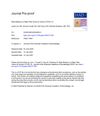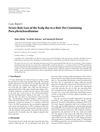 57 citations,
October 2021 in “Journal of ethnopharmacology”
57 citations,
October 2021 in “Journal of ethnopharmacology” Indian herbal medicine shows promise for treating skin diseases but needs more research to prove effectiveness.

Hair and nails can show hormone changes during puberty in dogs.
 273 citations,
May 2017 in “The Lancet”
273 citations,
May 2017 in “The Lancet” Some drugs can cause rare but potentially deadly skin reactions, and early treatment and avoiding the drug again are key.
 158 citations,
May 1968 in “The journal of nutrition/The Journal of nutrition”
158 citations,
May 1968 in “The journal of nutrition/The Journal of nutrition” Zinc is crucial for growth and health in rats.
 115 citations,
June 2004 in “Pediatrics”
115 citations,
June 2004 in “Pediatrics” Children, especially teenagers, can get severe SARS-CoV infection with symptoms similar to adults, but they typically recover well with supportive care.
 84 citations,
March 2010 in “Infectious Disease Clinics of North America”
84 citations,
March 2010 in “Infectious Disease Clinics of North America” The document concludes that rapid identification, isolation, and strict infection control are crucial to manage SARS outbreaks.
 49 citations,
April 2015 in “Emerging Infectious Diseases”
49 citations,
April 2015 in “Emerging Infectious Diseases” Artesunate is generally safe for severe malaria, but patients should be monitored for delayed anemia after treatment.
49 citations,
January 2012 in “Dermatology” Severe anti-TNF-α induced scalp eruptions often need stopping the drug and using systemic therapy to avoid scarring.
36 citations,
May 2005 in “BMC dermatology” DPCP is effective for treating severe alopecia areata, but relapse is common.
 35 citations,
November 2020 in “Dermatologic Therapy”
35 citations,
November 2020 in “Dermatologic Therapy” Severe COVID-19 may cause hair loss, and doctors recommend supplements and topical treatments to manage it.
 33 citations,
October 2017 in “Drug Safety”
33 citations,
October 2017 in “Drug Safety” SJS/TEN survivors often have severe, overlooked long-term physical problems that are not properly treated after leaving the hospital.
 32 citations,
January 2007 in “KARGER eBooks”
32 citations,
January 2007 in “KARGER eBooks” Severe insulin resistance can be managed with medication, lifestyle changes, and treatment for related conditions.
30 citations,
August 1998 in “International Journal of Dermatology” Systemic corticosteroids don't prevent severe alopecia areata from spreading or relapsing.
 29 citations,
July 2020 in “Journal of The American Academy of Dermatology”
29 citations,
July 2020 in “Journal of The American Academy of Dermatology” Men with severe balding have a higher risk of getting very sick from COVID-19.
 20 citations,
June 2011 in “ISRN Dermatology (Print)”
20 citations,
June 2011 in “ISRN Dermatology (Print)” A woman lost most of her hair due to an allergic reaction to a hair dye ingredient.
 19 citations,
November 2016 in “Dermatology and therapy”
19 citations,
November 2016 in “Dermatology and therapy” Stopping the medication infliximab and starting new treatments helped a woman's hair grow back and improved her scalp condition.
 19 citations,
November 2012 in “Journal of Dermatological Treatment”
19 citations,
November 2012 in “Journal of Dermatological Treatment” Isotretinoin improves severe acne without changing androgen or insulin levels but may increase body weight and triglycerides.
 19 citations,
June 2011 in “British Journal of Dermatology”
19 citations,
June 2011 in “British Journal of Dermatology” Severe digestive issues in DRESS need early endoscopy for better treatment.
 19 citations,
July 1983 in “American Journal of Kidney Diseases”
19 citations,
July 1983 in “American Journal of Kidney Diseases” Minoxidil lowers blood pressure in kids with kidney issues, but use carefully due to side effects.
19 citations,
August 1972 in “PubMed” The patient had a severe allergic reaction to gold treatment.
 16 citations,
August 2011 in “Annals of Allergy Asthma & Immunology”
16 citations,
August 2011 in “Annals of Allergy Asthma & Immunology” A woman with severe angioedema improved significantly after treatment with rituximab.
16 citations,
April 2000 in “Contact dermatitis” A man developed severe skin reactions after using a treatment for hair loss.
 15 citations,
December 2011 in “Journal of the European Academy of Dermatology and Venereology”
15 citations,
December 2011 in “Journal of the European Academy of Dermatology and Venereology” Hair loss in systemic lupus erythematosus patients is unique and improves with treatment.
14 citations,
November 2009 in “Dermatologic Surgery” Laser hair removal can cause severe allergic reactions.
 14 citations,
June 1952 in “The BMJ”
14 citations,
June 1952 in “The BMJ” Phenobarbitone can cause severe and sometimes fatal skin reactions.
 13 citations,
March 2014 in “Cutaneous and Ocular Toxicology”
13 citations,
March 2014 in “Cutaneous and Ocular Toxicology” Oral isotretinoin for severe acne can change hormone levels but does not significantly affect ovarian function.
13 citations,
June 2012 in “Dermatologic Surgery” Severe scars need a mix of treatments for best results.
13 citations,
March 2011 in “Acta Paediatrica” Tinea capitis needs systemic treatment to avoid severe outcomes.
13 citations,
July 2004 in “Pediatric dermatology” A new severe form of monilethrix syndrome includes hair loss, scalp itching, cataracts, and distinct facial features.
 10 citations,
October 2015 in “Journal of the International Association of Providers of AIDS Care”
10 citations,
October 2015 in “Journal of the International Association of Providers of AIDS Care” A woman with HIV had a severe skin condition that improved with antiretroviral therapy.





















